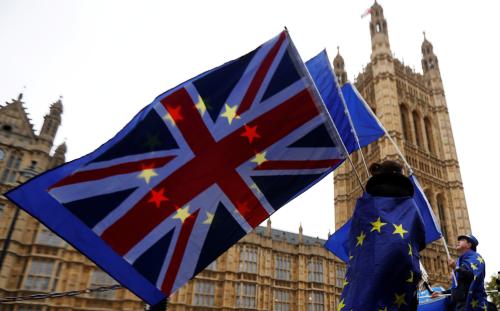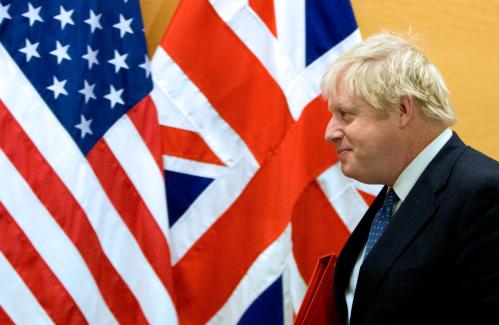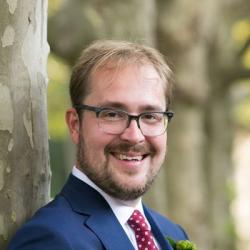“In our long history as a country we’ve experienced famine, oppression, sectarian conflicts, economic crisis, and mass immigration,” Leo Varadkar, Taoiseach of Ireland, noted in a St. Patrick’s Day week speech at Brookings as part of the Alan and Jane Batkin International Leaders Forum. To that list can be added the present challenge of managing the United Kingdom’s exit from the European Union, and its impact on the Irish border and the Irish economy. Brexit was certainly a topic of Varadkar’s discussion with Center on the United States and Europe director Thomas Wright and the audience. Varadkar also highlighted Ireland’s global ambitions as “an island at the center of the world,” seeking a seat on the U.N. Security Council and positioning itself as a “bridge” between the United States and an EU in which Dublin will soon be the leading Anglophone capital.
BREXIT
https://www.youtube.com/watch?v=b6FOGQEDkJ8?start=524&end=773
Varadkar was blunt on the threats posed by Brexit, arguing that Ireland “will suffer more negative economic impacts than any other EU member state, perhaps even more so than the United Kingdom itself.” Dublin thus aims for “a deep and comprehensive future relationship” between the U.K. and the EU, “limited only by the United Kingdom’s own red lines.” The Taoiseach zeroed in, as the EU-U.K. negotiations have thus far, on mitigating how Brexit threatens the Good Friday Agreement by potentially driving a wedge “between Britain and Ireland, between Northern Ireland and Ireland, and between the two communities of Northern Ireland,” Catholic and Protestant.
Wright noted that three potential solutions to the issue of the Irish border “have all been ruled out by people who effectively yield a veto”—a hard border by Ireland and the rest of the EU, Britain staying in the Customs Union by the country’s ruling Conservatives, and special status for Northern Ireland by the Democratic Unionist Party (DUP), which supports Theresa May’s government. Varadkar argued that the Irish border had become “the central question in Brexit negotiations” because it “crystalizes” the bigger issue of what relationship the U.K. wants with the EU after its withdrawal—”and I’m not sure they fully know yet.” He described special status for Northern Ireland as a “backstop” and a hard border as an outcome only possible following a “major political accident.” Stressing that U.K. voters chose “by a very small margin to leave the European Union” with Northern Ireland and Scotland against, and that this had “been interpreted as a very hard Brexit,” he argued that “the best solution” was to render the border issue “irrelevant” by keeping the U.K. and EU close; yet, he recognized that this would require a change in policy and position by London, which was not yet forthcoming.
Varadkar noted the “corrosive and damaging” absence for more than a year of cross-community institutions in Northern Ireland. He said that engagement from the Trump administration, members of Congress, and Irish America in upholding the peace process “would be very welcome,” but doubted that a special envoy was required at present.
IRELAND IN EUROPE
https://www.youtube.com/watch?v=b6FOGQEDkJ8?start=34&end=344
Varadkar described Ireland as a trading nation and posited that “to me, the European project…is all about free enterprise, all about trade, all about economic development.” When Wright asked about the United States and Europe potentially being on the cusp of escalating tariffs, the Taoiseach noted that while Ireland doesn’t produce much steel and aluminum, the EU’s threatened retaliatory tariffs on certain products including bourbon could lead to trade wars over whiskey. “There are some forces in the European Union…who would relish the prospect of imposing restrictions on investment or tariffs on American companies in the false belief that that would then allow European companies to fill the gap,” he stated. He dismissed this as “a nonsensical doctrine of protectionism” and said he would try to make his point to President Trump later in the week that no one would gain from such policies. Within the EU, Ireland is forming “new alliances” with Nordic countries, Baltic countries, and some southeastern European countries “with a similar outlook when it comes to free enterprise and trade.”
Stressing bilateral economic ties, including Irish companies’ employment and investment in the United States as well as U.S. investment in Ireland “as a gateway to the EU Single Market,” Varadkar described Ireland as “willing to act as a bridge between the United States and the EU, to interpret one to the other, and help ensure that positive and constructive relations are maintained and developed.” Such a role is one Ireland can play because of friendship, shared language, economic ties, and “very similar political and business culture,” and is “all the more important when the UK is no longer sitting around the table.” However, Varadkar clarified that Ireland was not “offering ourselves up as America’s agents” in the bloc—”we’re committed members…we’re going to be at the heart of the EU.”
THE VOICE OF A SMALL COUNTRY
https://www.youtube.com/watch?v=b6FOGQEDkJ8?start=1120&end=1314
“We see ourselves as a global country, not so much an island behind an island at the edge of a continent, but rather an island at the center of the world,” Varadkar said at the start of his opening remarks, emphasizing Ireland’s commitment to play “a leadership role in the world” and help make “the world’s problems more manageable.”
At a time when the world is becoming increasingly more geopolitically competitive, “major challenges we face will be best dealt with by acting together—and not in isolation,” the Taoiseach argued. He highlighted that Ireland has been a founding member of the European Union’s Single Market, the single currency, and most recently of the Permanent Structured Cooperation (PESCO), the EU’s new enhanced cooperation framework on defense and security. He also stressed Ireland’s key role in negotiating the U.N. Sustainable Development Goals, promoting disarmament and nonproliferation, and supporting collective security represented by the United Nations, by providing peacekeeping troops to six of its missions.
“We are a country that trades, that travels, that engages with the world,” Varadkar said. Quoting President Kennedy’s address to the Irish Parliament in June 1963, he stated that “one of the strongest things that small countries can do is to use their own voice…backed up by real engagement in international institutions.” For that reason, Ireland is seeking a seat on the U.N. Security Council for the 2021-2022 term. Meanwhile, with its border at the heart of the EU’s response to the challenge of Brexit, Ireland’s voice is indeed being heard. Days before his remarks at Brookings, the President of the European Council Donald Tusk stated that in negotiations with London, the bloc would be putting “Ireland first” in the negotiations.
The Brookings Institution is committed to quality, independence, and impact.
We are supported by a diverse array of funders. In line with our values and policies, each Brookings publication represents the sole views of its author(s).








Commentary
Ireland’s Taoiseach on the challenge of Brexit and the power of small countries
March 27, 2018